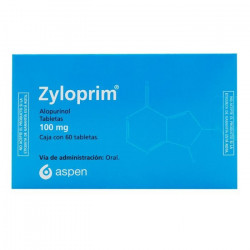Zyloprim (allopurinol) Coupons, Discounts & Cost
Zyloprim (allopurinol) is a drug that prevents uric acid synthesis. One way to save money on the Zyloprim (allopurinol) retail cost regardless of income and insurance status is to use Zyloprim (allopurinol) coupons or discount cards from RXCoupons. Use our Zyloprim (allopurinol) coupons at your online pharmacy and receive up to 75% off the sale price each time you refill your prescription.
What is Zyloprim (allopurinol)
Zyloprim (allopurinol) is a drug that prevents uric acid synthesis. Allopurinol breaks the synthesis of uric acid, reduces its levels in the body and promotes dissolution of urate crystals.
When I should use Zyloprim (allopurinol)
Zyloprim (allopurinol) is used in hyperuricemia, primary and secondary gout, kidney stones, cytostatic and radiation therapy, psoriasis, traumatic toxicosis, corticosteroid therapy in nephropathy, malignant neoplasms and diseases of purine metabolism in children.
When I should avoid Zyloprim (allopurinol)
Do not use Allopurinol in the following cases: hypersensitivity, severe renal failure, pregnancy and breastfeeding. Allopurinol should be discontinued immediately if any signs of hypersensitivity reactions occur.
Allopurinol is contraindicated in children's age (up to 14 years). It may be used in children only in malignant tumors and congenital disorders of purine metabolism. It is not recommended in congestive heart failure, diabetes, hypertension.
How I should take Zyloprim (allopurinol)
Start with 100 mg per day, and then gradually increase the dose. If the single dose of 300 mg per day causes unwanted gastrointestinal side effects, it is possible to try divided daily doses of Allopurinol.
Zyloprim (allopurinol) must be used after meals.
Adults should take 100-200 mg per day (up to 700-900 mg per day in severe conditions).
Children up to 15 years should take 10-20 mg/kg per day (up to 400 mg per day maximum), or 100 mg per day in severe renal insufficiency.
Allopurinol therapy for elderly patients can be safe and effective with lower starting doses.
Different types of Zyloprim (allopurinol) side effects
Cardio-vascular system: in rare cases - arterial hypertension, bradycardia.
Hemopoiesis: in rare cases - agranulocytosis, aplastic anemia, thrombocytopenia, leukopenia (most likely in patients with impaired renal function).
Digestive system: dyspepsia (including nausea, vomiting), diarrhea; in rare cases - stomatitis, liver dysfunction, hepatitis.
Central and peripheral nervous system: in rare cases - weakness, fatigue, headache, dizziness, drowsiness, depression, seizures, cataracts, coma.
Endocrine system: in rare cases - infertility, impotence, diabetes.
Urinary system: in rare cases - interstitial nephritis, swelling, uremia, hematuria.
Allergic reactions: skin rash, redness, itching; in rare cases - arthralgia, fever, Stevens-Johnson syndrome, toxic epidermal necrolysis, furunculosis, alopecia, hair discoloration.
Zyloprim (allopurinol) special instructions
Zyloprim (allopurinol) should be used with caution in clinical signs and symptoms of liver or renal problems, hypothyroidism. It is essential that your doctor continue to monitor liver function systematically.
Patients should consume 2 liters of fluids daily during treatment with Allopurinol.
Zyloprim (allopurinol) is used in children only in malignant tumors (especially leukemia), as well as in some enzymatic disorders (Lesch–Nyhan syndrome).
Alcoholic beverages are not permitted in Allopurinol therapy.
Allopurinol should be used with caution in patients whose activities require high concentration and rapid psychomotor reactions.
What drug combinations to avoid with Zyloprim (allopurinol)
Zyloprim (allopurinol) enhances the effect of coumarin anticoagulants and hypoglycemic agents (especially in renal impairment).
Uricosuric medications and salicylates in high doses may reduce the activity of Allopurinol.
Co-administration with iron-containing products can increase iron overload in the liver.
How to recognize Zyloprim (allopurinol) overdose
Symptoms of Zyloprim (allopurinol) overdose may include nausea, vomiting, diarrhea, dizziness, low output of urine.
How to store Zyloprim (allopurinol)
This medication should be stored at room temperature.

